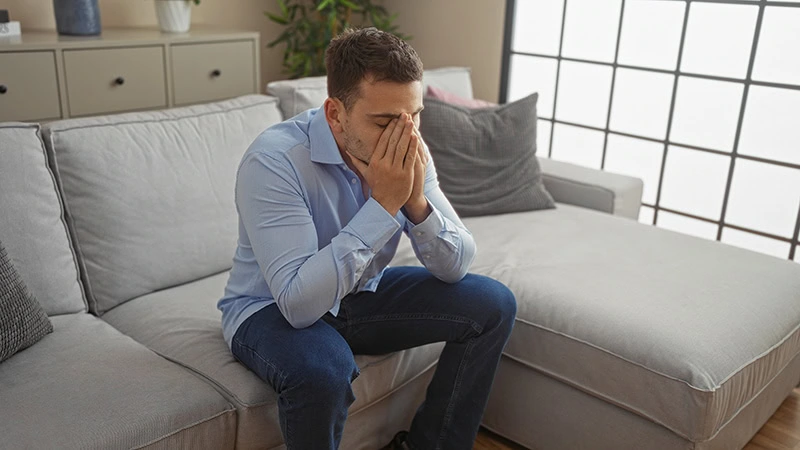Depression Treatment in Spokane

Spokane Depression Treatment Program
Rebuilt Treatment & Recovery is a trusted mental health and addiction treatment center in Spokane, Washington. We use the most evidence-based therapies and treatments for depression, making our center a leading choice for individuals and families looking for depression treatment in Spokane and surrounding areas. Every client at Rebuilt Treatment & Recovery gets personalized treatment plans, and the empowering resources offered at our center set us apart from other treatment options nearby.
Why Depression Treatment Matters
Depression is one of the most prevalent mental health conditions in the United States. According to a fact sheet from the National Alliance on Mental Illness (NAMI), 46.3 percent of Washington adults reported symptoms of depression or anxiety in February 2021. People with depression are at an increased risk of unfavorable outcomes like some physical health conditions, decreased quality of life, and substance abuse. However, there are effective treatments for depression. Getting appropriate treatment for depression can improve your quality of life and overall well-being. If you are someone who faces drug or alcohol abuse, depression treatment may also decrease your need to use substances. These are just a few of the reasons why depression treatment matters. Depression can negatively affect all aspects of your life, from work to self-care to interpersonal or familial relationships. With the right approach, you can get relief from depression symptoms.

Depression Treatment in Spokane at Rebuilt Treatment & Recovery
When you get depression treatment in Spokane at Rebuilt Treatment & Recovery, you might participate in several levels of care. We offer the following programs and services, among many other resources, for individuals in mental health and addiction recovery.
A partial hospitalization program (PHP) is a step down from residential inpatient treatment or a step up from a typical intensive outpatient program. The PHP at Rebuilt Treatment & Recovery is immersive, meeting for about six hours per day, four days per week. As a PHP client at Rebuilt Treatment & Recovery, you will participate in daily groups alongside once-weekly individual therapy sessions with your assigned therapist and other activities included in your personalized depression treatment plan.
The intensive outpatient program (IOP) at Rebuilt Treatment & Recovery meets three days per week for groups for about three hours per day in addition to regular individual therapy sessions. Since IOP clients at Rebuilt Treatment & Recovery have a lower time commitment than our PHP clients do, IOP can be ideal for those who are transitioning out of PHP or who need to work (or attend to similar responsibilities) during treatment.
The standard outpatient program at Rebuilt Treatment provides ongoing support for clients stepping down from IOP. Clients in our outpatient program usually participate in 1-2 hours of groups per week for ongoing care, alongside bi-weekly individual therapy sessions.
Since depression can raise the risk of substance abuse, it is crucial that medical and mental health providers adequately assess for and treat both when applicable. Rebuilt Treatment & Recovery offers dual diagnosis treatment in Spokane for clients facing drug or alcohol abuse and co-occurring disorders like depression. In research, dual-diagnosis treatment is linked to positive outcomes such as improvements in psychiatric functioning, fewer medication interactions, reduced or eliminated substance use, decreased hospitalization, and a better quality of life.
Our sober housing in Spokane provides an added sense of community and accountability for those in recovery. Rebuilt Treatment & Recovery offers sober housing for men in our programs; women at Rebuilt Treatment & Recovery can get sober living referrals from our team.
Getting Depression Treatment in Spokane at Rebuilt Treatment
Getting depression treatment in Spokane at Rebuilt Treatment & Recovery means that you will have access to a dedicated team of staff members and the most evidence-based treatments used for depression and other disorders. Notable attributes of our programs include but aren’t limited to the following.
- Effective treatments for adults with depression, such as cognitive behavioral therapy (CBT), mind and body wellness, and medication management services.
- Transportation to and from therapy sessions at Rebuilt Treatment.
- Full-time case managers who can help with employment and other needs.
- Weekend access to grocery stores and recovery meetings.
- Gym memberships and bus passes for clients.
- Help with food assistance as needed.
- Sober activities on weekends.
Even better, the programs at Rebuilt Treatment & Recovery are covered by most forms of insurance, including Medicaid and private insurance plans. Please call Rebuilt Treatment if you have any questions about insurance coverage or our programs and services.
Signs and Symptoms of Depression
Depression takes many different forms, and the type of depressive disorder you have can influence the specific signs and symptoms of depression you experience. With that in mind, common signs and symptoms of depression include:
- A down, low, or depressed mood.
- Feelings of guilt, hopelessness, or worthlessness.
- Loss of interest in significant activities (e.g., hobbies) you once found enjoyable.
- Social isolation or withdrawal from others.
- Thoughts of suicide or self-harm.
- Sleeping too much or too little.
- Slowed psychomotor activity.
- Changes in appetite.
- Emotional numbness.
- Excessive crying.
- Irritability.
Rebuilt Treatment & Recovery provides evaluations and assessments for mental health conditions, including depressive disorders. We are here to help you or your loved one find the path to depression management that works best for them.

Causes of Depression
What are the causes of depression? Although there is no known singular cause of depressive disorders, some factors can increase your risk of developing mood disorders like depression. These may include but are not limited to the following.
- Family history. People who have a family history of mental health conditions like depression can be more likely to develop a depressive disorder themselves.
- Trauma and stress. Traumatic and stressful events are associated with an increased risk of depression and other disorders.
- Personal history of other physical or mental health conditions. Other physical or mental health conditions, like diabetes, cancer, and anxiety disorders, increase the likelihood of depression.
At the end of the day, anyone can develop depression. Effective, individualized treatment for depression at Rebuilt Treatment & Recovery can help you achieve your goals and get to where you want to be.
Call Rebuilt Treatment & Recovery for Depression Treatment in Spokane
Rebuilt Treatment & Recovery provides a comfortable healing environment with everything clients like you or your loved one need to rebuild and recover from mental or behavioral health concerns like depressive disorders. Please call Rebuilt Treatment & Recovery for depression treatment in Spokane today at (509) 286-2788 to talk with one of our specialists, commitment-free. You can also complete the intake form on our website to start the process now.
Explore All of Our Services
Life Skills
One of the many ways RTR will help clients with life skills is by teaching them how to communicate effectively and learning how to deal with thoughts and emotions in a healthy and beneficial way.
Process Group
Being a part of a process group at RTR allows feedback, perspective, and accountability from peers and helps challenge one another on negative beliefs and behaviors, while providing support and encouragement to make positive changes.
Relapse Prevention
Relapse Prevention is a crucial aspect of addiction treatment focusing on identifying triggers, developing coping strategies, and creating a supportive environment to minimize the risk of relapse.
